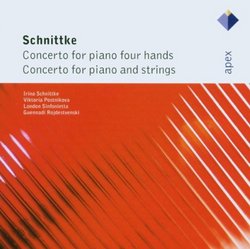| All Artists: Schnittke, Postnikova, London Sinfonietta Title: Schnittke: Cto for Pno 4 Hands / Cto for Pno & Str Members Wishing: 0 Total Copies: 0 Label: Wea Apex Classics UK Release Date: 5/30/2006 Album Type: Import Genre: Classical Style: Number of Discs: 1 SwapaCD Credits: 1 UPC: 809274981127 |
Search - Schnittke, Postnikova, London Sinfonietta :: Schnittke: Cto for Pno 4 Hands / Cto for Pno & Str
 | Schnittke, Postnikova, London Sinfonietta Schnittke: Cto for Pno 4 Hands / Cto for Pno & Str Genre: Classical
|
Larger Image |
CD Details |
CD ReviewsThe best so far villegem | canada | 01/12/2008 (5 out of 5 stars) "Despite many new releases of the Concerto for Piano & Strings -the Spivakov, Khudolei versions come to mind-, Postnikova's version remains the best available now re-released on Apex. Although some liberty is taken with the text rythmically, Postnikova and her husband the conductor Rozhdestvensky convey with imposing solemnity the gist of the concerto. So this re-issue of the Erato original release is a must have. I also wish to suggest another recording equally powerful released as a bonus track of the performance of Schnittke Sonata for Piano No.1 and the premiere recording of all 7 Little Piano Pieces because of its lesser sound quality, of the latest concert conducted by Maestro Yuri Nikolaevsky, a personal friend of Schnittke and soloist Svetlana Ponomareva available on amazon canada. Of special interest, her website (ponomarevapianist) also shows the video of this concert,as well posted on video google canada. Musicweb International commented "this was a significant and powerful performance". Finally the Concerto for Piano Four Hands is with Irina Schnittke and Postnikova a remarkable piece prefacing Schnittke's later style. This Apex CD is a bargain and again a MUST Have. " An excellent performance of the Concerto for Piano and Strin Christopher Culver | 08/28/2008 (3 out of 5 stars) "I'm happy to see that this old Erato disc has now been reissued in Warner's budget line Apex. It features one of Alfred Schnittke's most popular works in excellent performance along with, as far as I know, the only recording of a late work. Gennady Rozhdestvensky leads the London Sinfonietta, with Viktoria Postnikova as piano soloist, and the composer's widom Irina Schnittke appearing on the piano four-hand work.
The Concerto for Piano and String Orchestra (1979) uses many different features and is a combination of variation, sonata, and cyclic form, with one theme related to Orthodox chant and another a twelve-tone series with tonal features, the whole being fairly easily graspable. The concerto starts its peak early with an ostinato reminscent of Sofia Gubaidulina ("Zeitgestalten" or the "Viola Concerto"), and then a heavy cadenza, while the second half of the piece is played piano. This is a fine work, and one of the composer's most accessible and engaging with its clear dramatic arc. I'm amazed that it hasn't entered the standard repertoire. In this recording Rozhdestvensky takes it very slow, with his reading clocking in at 26 minutes compared to e.g. Markiz' 20:30 on a BIS recording. Nonetheless, due to the performers involved and their close personal relationships with Schnittke, I'm drawn to consider this recording authoritative. The Concerto for Piano Four Hands and Chamber Orchestra (1988) is a somewhat different kind of work, written after Schnittke's first stroke when his style became progressively more spare and bleak. The overall structure is of six sections in one movement, continually rising to peaks that then fall in total catastrophe, and ending with a pianissimo thread that seems to cut off in mid-sentence. There's a quotation from Shostakovich's Eleventh Symphony, and a preoccupation with Romantic excess that was soon to disappear from Schnitke's music. While the result is entertaining enough on one listen, I don't feel like this work calls me back for repeating listening--a problem I have with much late Schnittke." |

 Track Listings (2) - Disc #1
Track Listings (2) - Disc #1